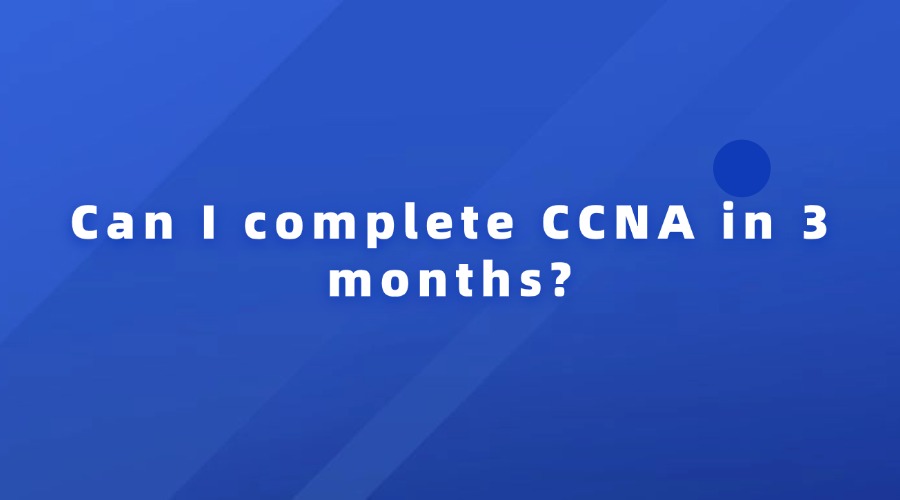What is the pass rate for the Cisco exam?
Update time:2024-11-01
Cisco certifications are highly respected in the IT industry, validating an individual’s knowledge and skills in networking, security, and other critical technologies. These certifications, however, come with a reputation for being difficult. One of the key concerns many candidates have is the pass rate for Cisco exams. Unfortunately, Cisco doesn’t publicly release exact pass rates for its exams, making it hard to pinpoint an official percentage. However, by analyzing various factors, such as exam difficulty, candidate feedback, and study patterns, we can get a general sense of what the pass rates might be.

In this article, we will explore the factors that affect the pass rate for Cisco exams, discuss the difficulty levels of different Cisco certifications, and provide tips on how to improve your chances of passing.
Understanding Cisco Exams
Cisco offers a variety of certifications, each designed for different levels of expertise and specialties in networking. Some of the most popular Cisco certifications include:
Cisco Certified Technician (CCT) – Entry-level certification.
Cisco Certified Network Associate (CCNA) – Associate-level certification.
Cisco Certified Network Professional (CCNP) – Professional-level certification.
Cisco Certified Internetwork Expert (CCIE) – Expert-level certification.
The difficulty and pass rates vary greatly depending on the certification level and the specific exam. Entry-level exams, such as the CCT or CCNA, tend to have higher pass rates compared to the more advanced certifications like CCNP and CCIE, which are known to be much tougher.
Factors Affecting the Pass Rate
1. Exam Complexity
The complexity of Cisco exams increases as you move up through the certification levels. Exams at the associate level (such as the CCNA) are generally considered manageable for individuals with a few months of study and some hands-on experience. However, professional-level exams (such as CCNP) require deeper knowledge, and expert-level exams (such as CCIE) are notoriously difficult.
For instance, the CCNA exam covers topics like network fundamentals, security, IP routing, and automation, which are broad but don’t delve into extreme detail. On the other hand, the CCNP and CCIE exams require a comprehensive understanding of complex topics like enterprise network architecture, routing protocols, and advanced troubleshooting, which can be more challenging to master.
2. Hands-on Skills Requirement
Cisco exams don’t just test theoretical knowledge; they also emphasize practical skills. Many of the questions are based on real-world scenarios that require candidates to configure or troubleshoot networks. For exams like the CCIE, there is a significant hands-on component that requires candidates to solve complex network problems in a timed lab setting. The need for hands-on skills significantly impacts the pass rate, as some candidates struggle with applying their theoretical knowledge to practical tasks.
3. Time Pressure
Cisco exams are timed, adding another layer of difficulty. For example, the CCNA exam typically lasts around 120 minutes and includes about 100 questions. The CCNP exams can be even longer, with some lasting up to 4 hours. Time pressure can be stressful for candidates, especially when they are faced with challenging simulation-based questions that require configuring or troubleshooting networks in real-time.
4. Candidate Background
The pass rate for Cisco exams is also influenced by the background of the candidates. Those with prior experience in networking, IT support, or similar fields tend to perform better because they already have hands-on experience with routers, switches, and other networking technologies. On the other hand, candidates who are new to networking may find it more difficult to pass, particularly if they are trying to rush through their studies without building a solid foundation.
Contact me immediately to get the golden key helping you fast express your certificate. Estimated Pass Rates for Cisco Certifications
While Cisco doesn’t provide official pass rates, estimates from training providers and exam candidates suggest some approximate figures:
1. Cisco Certified Technician (CCT)
Pass rates for CCT are generally higher compared to other Cisco certifications because the exam focuses on basic technical knowledge. Many estimate the pass rate to be around 70-80%, making it one of the more manageable Cisco exams.
2. Cisco Certified Network Associate (CCNA)
The CCNA is known to be challenging but manageable with proper study. Many candidates estimate the pass rate to be between 65-75%, although this can vary depending on the candidate’s preparation and prior experience. For those who thoroughly prepare and practice using real or simulated labs, the pass rate tends to be higher.
3. Cisco Certified Network Professional (CCNP)
CCNP exams are more difficult than CCNA, focusing on more advanced topics. Pass rates for the CCNP exams are estimated to be around 50-60%, with many candidates needing multiple attempts to pass. The difficulty of these exams comes from the depth of knowledge required and the variety of topics covered, such as routing, switching, and network security.
4. Cisco Certified Internetwork Expert (CCIE)
The CCIE is one of the most difficult IT certifications in the world. The written exam is challenging enough, but the real hurdle is the 8-hour hands-on lab exam, which tests candidates’ abilities to configure, troubleshoot, and diagnose complex network issues in a controlled environment. The pass rate for CCIE lab exams is estimated to be between 20-30%, with many candidates needing several attempts before they pass. This low pass rate is due to the high level of expertise required and the intense practical skills component.
How to Improve Your Chances of Passing
Given the challenges associated with Cisco exams, proper preparation is crucial. Here are some tips to help improve your chances of passing:
1. Understand the Exam Objectives
Start by thoroughly reviewing the exam blueprint provided by Cisco. This will give you a clear idea of what topics will be covered and what areas you need to focus on during your studies.
2. Use a Variety of Study Materials
Don’t rely on just one resource. Use Cisco’s official study guides, watch online tutorials, and participate in practice labs. Many candidates find that using multiple study materials helps them gain a well-rounded understanding of the topics.
3. Get Hands-on Practice
The practical nature of Cisco exams means that hands-on experience is essential. If you don’t have access to physical networking equipment, you can use simulation tools like Cisco Packet Tracer or GNS3 to practice configuring and troubleshooting networks.
4. Take Practice Exams
Familiarize yourself with the format of the exam by taking practice tests. This will help you get comfortable with the types of questions you’ll encounter and will also help you manage your time during the actual exam.
5. Join Study Groups or Forums
Engaging with a community of learners can provide valuable insights, tips, and support. Many candidates find study groups or online forums helpful for discussing difficult topics and sharing resources.
Conclusion
Cisco exams are known for being challenging, and pass rates vary depending on the certification level. While entry-level exams like the CCT have relatively high pass rates, more advanced certifications such as the CCNP and CCIE have much lower pass rates due to their complexity. However, with thorough preparation, hands-on practice, and the right resources, candidates can significantly improve their chances of passing these exams. Success on a Cisco exam is not just about memorizing facts; it’s about understanding how to apply knowledge in real-world networking scenarios.
I'm your man who have the 100% valid dumps , buy it now for 50% off to clear your exam!
Click it ↓↓

In this article, we will explore the factors that affect the pass rate for Cisco exams, discuss the difficulty levels of different Cisco certifications, and provide tips on how to improve your chances of passing.
Understanding Cisco Exams
Cisco offers a variety of certifications, each designed for different levels of expertise and specialties in networking. Some of the most popular Cisco certifications include:
Cisco Certified Technician (CCT) – Entry-level certification.
Cisco Certified Network Associate (CCNA) – Associate-level certification.
Cisco Certified Network Professional (CCNP) – Professional-level certification.
Cisco Certified Internetwork Expert (CCIE) – Expert-level certification.
The difficulty and pass rates vary greatly depending on the certification level and the specific exam. Entry-level exams, such as the CCT or CCNA, tend to have higher pass rates compared to the more advanced certifications like CCNP and CCIE, which are known to be much tougher.
Factors Affecting the Pass Rate
1. Exam Complexity
The complexity of Cisco exams increases as you move up through the certification levels. Exams at the associate level (such as the CCNA) are generally considered manageable for individuals with a few months of study and some hands-on experience. However, professional-level exams (such as CCNP) require deeper knowledge, and expert-level exams (such as CCIE) are notoriously difficult.
For instance, the CCNA exam covers topics like network fundamentals, security, IP routing, and automation, which are broad but don’t delve into extreme detail. On the other hand, the CCNP and CCIE exams require a comprehensive understanding of complex topics like enterprise network architecture, routing protocols, and advanced troubleshooting, which can be more challenging to master.
2. Hands-on Skills Requirement
Cisco exams don’t just test theoretical knowledge; they also emphasize practical skills. Many of the questions are based on real-world scenarios that require candidates to configure or troubleshoot networks. For exams like the CCIE, there is a significant hands-on component that requires candidates to solve complex network problems in a timed lab setting. The need for hands-on skills significantly impacts the pass rate, as some candidates struggle with applying their theoretical knowledge to practical tasks.
3. Time Pressure
Cisco exams are timed, adding another layer of difficulty. For example, the CCNA exam typically lasts around 120 minutes and includes about 100 questions. The CCNP exams can be even longer, with some lasting up to 4 hours. Time pressure can be stressful for candidates, especially when they are faced with challenging simulation-based questions that require configuring or troubleshooting networks in real-time.
4. Candidate Background
The pass rate for Cisco exams is also influenced by the background of the candidates. Those with prior experience in networking, IT support, or similar fields tend to perform better because they already have hands-on experience with routers, switches, and other networking technologies. On the other hand, candidates who are new to networking may find it more difficult to pass, particularly if they are trying to rush through their studies without building a solid foundation.
Contact me immediately to get the golden key helping you fast express your certificate. Estimated Pass Rates for Cisco Certifications
While Cisco doesn’t provide official pass rates, estimates from training providers and exam candidates suggest some approximate figures:
1. Cisco Certified Technician (CCT)
Pass rates for CCT are generally higher compared to other Cisco certifications because the exam focuses on basic technical knowledge. Many estimate the pass rate to be around 70-80%, making it one of the more manageable Cisco exams.
2. Cisco Certified Network Associate (CCNA)
The CCNA is known to be challenging but manageable with proper study. Many candidates estimate the pass rate to be between 65-75%, although this can vary depending on the candidate’s preparation and prior experience. For those who thoroughly prepare and practice using real or simulated labs, the pass rate tends to be higher.
3. Cisco Certified Network Professional (CCNP)
CCNP exams are more difficult than CCNA, focusing on more advanced topics. Pass rates for the CCNP exams are estimated to be around 50-60%, with many candidates needing multiple attempts to pass. The difficulty of these exams comes from the depth of knowledge required and the variety of topics covered, such as routing, switching, and network security.
4. Cisco Certified Internetwork Expert (CCIE)
The CCIE is one of the most difficult IT certifications in the world. The written exam is challenging enough, but the real hurdle is the 8-hour hands-on lab exam, which tests candidates’ abilities to configure, troubleshoot, and diagnose complex network issues in a controlled environment. The pass rate for CCIE lab exams is estimated to be between 20-30%, with many candidates needing several attempts before they pass. This low pass rate is due to the high level of expertise required and the intense practical skills component.
How to Improve Your Chances of Passing
Given the challenges associated with Cisco exams, proper preparation is crucial. Here are some tips to help improve your chances of passing:
1. Understand the Exam Objectives
Start by thoroughly reviewing the exam blueprint provided by Cisco. This will give you a clear idea of what topics will be covered and what areas you need to focus on during your studies.
2. Use a Variety of Study Materials
Don’t rely on just one resource. Use Cisco’s official study guides, watch online tutorials, and participate in practice labs. Many candidates find that using multiple study materials helps them gain a well-rounded understanding of the topics.
3. Get Hands-on Practice
The practical nature of Cisco exams means that hands-on experience is essential. If you don’t have access to physical networking equipment, you can use simulation tools like Cisco Packet Tracer or GNS3 to practice configuring and troubleshooting networks.
4. Take Practice Exams
Familiarize yourself with the format of the exam by taking practice tests. This will help you get comfortable with the types of questions you’ll encounter and will also help you manage your time during the actual exam.
5. Join Study Groups or Forums
Engaging with a community of learners can provide valuable insights, tips, and support. Many candidates find study groups or online forums helpful for discussing difficult topics and sharing resources.
Conclusion
Cisco exams are known for being challenging, and pass rates vary depending on the certification level. While entry-level exams like the CCT have relatively high pass rates, more advanced certifications such as the CCNP and CCIE have much lower pass rates due to their complexity. However, with thorough preparation, hands-on practice, and the right resources, candidates can significantly improve their chances of passing these exams. Success on a Cisco exam is not just about memorizing facts; it’s about understanding how to apply knowledge in real-world networking scenarios.
I'm your man who have the 100% valid dumps , buy it now for 50% off to clear your exam!
Click it ↓↓
Previous:Are Cisco exams hard?
Next:CCNA exam topics?














